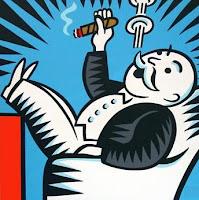 We all get caught up in generalities, see I just did it. It's too easy to take our experience and project it outward onto the world we perceive, that's how our brains work, learn, grow. In fact we have a deep need to "know" the nature of the world around us, or is it a simple fear of the unknown? In a way, we are our own authorities on each and every subject, even those we hardly know. Our brains have a way of explaining our world to us in story form to a degree that we feel comfortable with, whether we believe it or not. And in certain company it becomes important for us to speak authoritatively on a wide variety of topics, whether we believe it or not. Men tend to do this in social activity, women tend to do it with children. Did that sound too general, maybe offensively so? What is it about generalizations that put us in that awkward position, and usually engaged in a heated debate? Somewhere, on some deep level of our collective psyche, I believe we connect generalizations with bigotry and charge them both with the same dark connotation.
We all get caught up in generalities, see I just did it. It's too easy to take our experience and project it outward onto the world we perceive, that's how our brains work, learn, grow. In fact we have a deep need to "know" the nature of the world around us, or is it a simple fear of the unknown? In a way, we are our own authorities on each and every subject, even those we hardly know. Our brains have a way of explaining our world to us in story form to a degree that we feel comfortable with, whether we believe it or not. And in certain company it becomes important for us to speak authoritatively on a wide variety of topics, whether we believe it or not. Men tend to do this in social activity, women tend to do it with children. Did that sound too general, maybe offensively so? What is it about generalizations that put us in that awkward position, and usually engaged in a heated debate? Somewhere, on some deep level of our collective psyche, I believe we connect generalizations with bigotry and charge them both with the same dark connotation.But generalizations are not bigotry, bigotry is only the negative manifestation of generality. Let's look at how generalizations happen, and why. Our minds are often symbolized by the sword, sharp and precise, ready to dissect any matter into its' component parts. And in this process we start with a whole, complete world, untouched, undivided, what Buddhists call a Zen state of being. Thirsty for knowledge our minds quickly carve up the world into upper and lower, inner and outer, left and right, right and wrong. We don't just learn these words by definition, each word, each new dimension, is an entire concept to explore. Distinctions aren't truly knowledge until attached to a set of properties that distinguish them from one another. It's simply impossible for your mind not to overtly, or covertly collect this data about the distinctions separating men from women, Caucasian from Hispanic, African, Asian, etc.
Even the words "prejudice" and "discrimination" are stigmatized by their obvious connection to racism, but both are basic functions of the brain going back to our beginnings. Our brains are our greatest defense, and in uncertain moments the brain is pressed to make life and death decisions based on the information currently available. Often that information is limited to appearance, and even with no time at all to deliberate, our brains are processing all of this data and making decisions. But our brains are not just fear machines forever stuck in "fight or flight" mode, seeing everything as a potential threat. Throughout our collective human lifespan there has always been (and perhaps always will be) a simple fear of the different, the unknown. Our differences are on some level always seen as threatening, dangerous, even if we only feel uncomfortable as a result. If we can't collect information on those differences we grow even more uncomfortable with our fellow man, fellow woman. But at what point does our keen judgment and our discriminating taste become our prejudice and discrimination?
Generalizations serve an important function not limited to the division of the world, and it may be a way to re-unite a divided world. As important as it is for every person to learn the distinctions between male and female from a very early age, it's a delicate subject to discuss. A young boy may need to know that he shouldn't play as rough with girls as he does with his brothers, but a young man doesn't need to know that women are bad drivers. Some generalizations are true, and some just don't stand up to scrutiny, what's the difference? Often when making sweeping generalizations it's assumed that the problem was lumping way too many people together and painting them all with the same brush. But in many cases just the opposite is true, the statement really applies to a much larger grouping. In fact, men and women are bad drivers with some exceptions. Once this is realized the divided become united and perhaps together they can address the greater problem instead of bickering over careless generalizations.
Genders' simple duality is an easy case study compared to the diversity of race and culture. Observations made by race are almost always offensive, to suggest that a certain character trait can be attributed to skin color alone is in most cases demonstrably false. What does "Race" even mean? We're all the same species, we don't divide other species by race. If you take it literally it actually makes a lot of sense, a race is a competition. If we look at each other as being on different teams, striving for the same goal, we naturally want to get ahead and leave the other behind, maybe even cheat, sabotage, and ultimately undermine the perceived opponent. So why not just use the word "Culture" in its' place? Then perhaps we can discuss the subtle and not-so subtle differences between cultures in a way that allows for mutual appreciation, allows us to see our symbiotic relationships. Instead we tip toe through the discussion of race like a mine field full of cow patties, where stepping in a giant pile of crap seems a preferable outcome.
The key to unraveling a negative generalization is to put the parts back together and ask ones' self "Is the statement still true?" Hypocrisy is an obvious and common form of negative generalization, as when a white man believes all (or most) African Americans are thieves even as he participates in white collar crime. An honest look would lead someone to realize that we all (or most) steal in some form or another, we all commit some crime. When we allow a generalization to put the pieces back together again we can make better judgments. I believe there is nothing wrong with observing the character of different cultures, comparing and contrasting them against one another for the purpose of deep contemplation. But it's equally important that in this process we discover those universal character traits we all share so that we may contemplate our human nature, our bonding elements. Generalizations are like flowers, they are not intended to be frozen in the process of flowering, and when they fully unfold they show us how the diversity of the garden is the beauty of the garden.






.jpg)









































